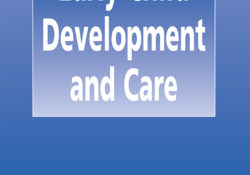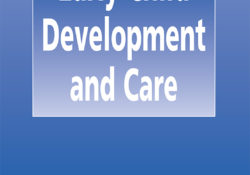eric.ed.gov har udgivet: This paper contributes to the theory and evidence that mathematical cognition is embodied. Drawing on the practices of primary teachers in South Africa engaged in a longitudinal research and development project — Wits Maths Connect–Primary — we report on aspects of lessons aimed at developing number sense through whole-class teacher-learner interaction. Two episodes are analysed from an embodied cognition perspective. The episodes focus on helping Grade 1 (6-year-olds) learners become fluent in counting forward and back or ordering numbers. Analysis reveals different embodied metaphors underlie the teachers’ actions, the nature of which are likely to lead to different learning opportunities. We conclude that our analysis supports a theory of embodied cognition, and demonstrates its usefulness as an analytical tool. [For the complete proceedings, see ED597799.] Link til… Continue Reading →
Like this:
Like Loading...
eric.ed.gov har udgivet: The Early Childhood Environment Rating Scale-Third Edition (ECERS-3) is the latest version of one of the most widely used observational tools for assessing the quality of classrooms serving preschool-aged children. This study was the first assessment of its factor structure and validity, an important step given its widespread use. An ECERS-3 observation was conducted in 1063 preschool classrooms in three states. In a subset of those classrooms (n = 119), Classroom Assessment Scoring System-Pre-K (CLASS Pre-K) and child assessment data were also collected. Analyses of the ECERS-3 suggested that a single factor does not adequately capture item variability. Of the solutions tested, the four-factor (Learning Opportunities, Gross Motor, Teacher Interactions, and Math Supports) provided the best combination of statistical support and theoretical utility. In general, the ECERS-3… Continue Reading →
Like this:
Like Loading...
eric.ed.gov har udgivet: This Data Point utilizes data from the High School Longitudinal Study of 2009 (HSLS:09), a nationally representative, longitudinal study of more than 23,000 ninth-graders in 2009. HSLS:09 surveyed students, their parents, math and science teachers, school administrators, and school counselors. The study included information about students who were enrolled in school in the fall term of 2009 as ninth-graders and who were not enrolled in school and had not earned a regular high school diploma or alternative credential such as a GED in spring 2012, when they should have been 11th-graders. These students are referred to as “dropouts” in this report Link til kilde
Like this:
Like Loading...
eric.ed.gov har udgivet: Among state community college systems, the 13 community colleges under the Tennessee Board of Regents (TBR) are probably the furthest along in implementing guided pathways reforms. All 13 colleges are implementing what they call “Tennessee completion practices”–reforms to help students choose, enter, navigate, and complete programs that prepare them for further education and careers. This report describes how the colleges are operationalizing the Tennessee completion practices in their own contexts, as well as how trends in leading indicators of student completion have changed since the reforms began. Drawing on colleges’ detailed self-assessments of their progress and telephone interviews with college administrators, staff, and faculty, the authors discuss how far along the colleges are in implementing completion practices in each of the four major areas of guided pathways… Continue Reading →
Like this:
Like Loading...
tandfonline.com har udgivet en rapport under søgningen “Teacher Education Mathematics”: ABSTRACT ABSTRACT The Special Issue on Early Care and Education (ECE) collaboration presents seven articles – followed by a commentary – that describe collaborations among different ECE programs. The articles present conceptual frameworks of ECE collaboration, explore the ways that organizations form and sustain ECE collaborations, and share findings regarding the outcomes of the collaborations. The studies employ a range of methods, including qualitative approaches, descriptive statistical analyses, regression analyses of survey data, network analysis, and mixed methods analyses. The articles and commentary in this special issue describe specific implications for policy and practice. Link til kilde
Like this:
Like Loading...
tandfonline.com har udgivet en rapport under søgningen “Teacher Education Mathematics”: Link til kilde
Like this:
Like Loading...
tandfonline.com har udgivet en rapport under søgningen “Teacher Education Mathematics”: ABSTRACT ABSTRACT This paper links early foundations in science for young children to the eventual achievement of science literacy for adults. There are five key arguments being made: (i) the early-years foundation stage (EYFS) specialists need to have a view for exactly what foundations are being laid in classrooms; (ii) that they all need to be – minimally – scientifically literate, despite the variety of definitions of that term; (iii) becoming scientifically literate is a long-term process of engaging with and developing an interest in ‘matters scientific’ that are easily available in the public domain; (iv) that there is a plethora of informal learning opportunities in science across the UK to foster adult engagement, and (v) taking a ‘helicopter view’… Continue Reading →
Like this:
Like Loading...
eric.ed.gov har udgivet: Turning everyday activities such as baking into scientific activities is more than just fun: it is important for our children’s futures. Science investigations provide an opportunity for children to learn about scientific concepts and listen to their peers, family, and community members, and to respond to their questions or ideas. It also provides them with an opportunity to ask and answer their own questions, build persistence, and improve their problem-solving and self-regulation skills, which are essential for academic success. As the world becomes increasingly science- and technology-oriented, all children need to become proficient in science, whatever their chosen field. STEM (science, technology, engineering, and math) education has become a national priority, and even early childhood teachers are expected to increase the quantity and quality of the science… Continue Reading →
Like this:
Like Loading...
eric.ed.gov har udgivet: The Illinois Early Learning Project (IEL) is funded by the Illinois State Board of Education to provide information resources on early learning and training related to implementing the Illinois Early Learning Standards for parents and for early childhood personnel in all settings. The IEL tip sheets offer suggestions to parents and early childhood personnel on a variety of topics related to children’s early experiences. This set of four tip sheets, in English- and Spanish-language versions, relates specifically to mathematics and science. Titles are as follows: (1)”CSI: Child Scientist Investigates!” which discusses ways to draw on preschoolers’ natural curiosity to teach them about science and scientific methods; (2) “Encouraging Scientific Thinking: Animal Study in the Classroom”; (3) “Things To Do while You’re Waiting: Math”; and (4) “Things To… Continue Reading →
Like this:
Like Loading...
eric.ed.gov har udgivet: The purpose of the study was to examine and describe the attitudes of Turkish early childhood children in science. This study explored the causal factors that influence children’s attitudes toward science such as teachers’ years of teaching experiences, frequency of teaching science in a week, and teachers’ teaching style. Turkish children (N=44) who live in the United States and engage in early childhood classroom involved into the study. Preschool teachers who had Turkish children in their classroom completed a survey for giving information about their Turkish children experiences in their science teaching activities. The Child’s Attitude Toward Science (CATS) survey which was developed by researchers was used while collecting data. The results showed that Turkish children have positive attitudes towards science especially in Life Science Topics. The… Continue Reading →
Like this:
Like Loading...


